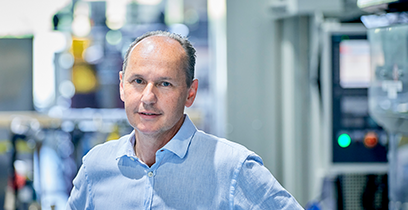
Hans Gattlen always wanted to be an entrepreneur. A trained lawyer, he worked in-house at Rieter Automotive and switched to a management role when the company embarked on an M&A spree. Having completed an EMBA with IMD in 2001, his subsequent role at industrial manufacturer Franke would prove significant.
During buyout discussions with family firm Egro on Franke’s behalf, Gattlen learned that the 50 family shareholders were unhappy with carving out the coffee machine part of the business. They knew that without the most profitable arm of the business the rest of the company would falter and collapse, but Franke wasn’t interested in taking on the subsidiary metalwork business as well. When the deal fell through, Gattlen saw his chance.
“I always dreamed of becoming an entrepreneur and I decided to take that risk,” he said. “I basically put in all my money – I had even pledged my chalet in the mountains – and, together with three friends, we took over the company. Our first steps were to restructure so that the company could survive, and it went well. From that point I realized that it was really my thing.”
Having witnessed the forced sales and destructive short-termism that can drive entrepreneurial activity, Gattlen also strove to do things differently. He recalled the example of a private equity company that funneled $5 million of its own money into a company, only to remove $10 million in management fees over the next 16 months. The behavior forced a profitable firm into bankruptcy and risked the livelihoods of the company’s 600 employees as well as the suppliers and everyone in the ecosystem.
“To me that’s morally unacceptable. There is no doubt that private money is important for our society, but it must respect values at the same time,” he said.
Entrepreneurial equity
Driven by those values, Gattlen has been a partner at EquityNova AG for more than 10 years and remains committed to creating sustainable and innovative businesses for the future.
“We call it ‘entrepreneurial equity’, which differentiates itself from the classic private equity in the sense that we never promise our investors an exit,” he explained. “If you promise the investors that you will sell the company after a few years, the closer you get to that deadline the greater the risk that you will take decisions that may optimize the purchasing price but are not necessarily in the best interests of the company.”
Gattlen also believes the trend to pursue profit by outsourcing production to low-wage countries might also be turning in the aftermath of the COVID-19 crisis as companies look to reinvigorate simplified, local contractors to shield themselves from the volatility and unpredictability of global supply chains.
“What we’ve seen in the past decades in Switzerland is that as soon as some machines had a certain volume, the production of components was often outsourced to East Eastern Europe or even further to Asia, which has led to business closures. Losing those businesses meant that production-related engineering expertise, world-leading skills, were lost,” he said.
A desire to revive Switzerland’s engineering and production expertise led him to co-found SwissFactory Group, whose mission is to nurture and preserve homegrown manufacturing capabilities. The Group’s 10 companies target the B2B market with capabilities that range from engineering to producing components and includes assembly of complete machines. The central premise is that the group can offer clients support along their entire value chain from concept to aftersales.
“The world has become increasingly complex,” he added. “It has become more and more challenging for a single, small to medium-sized enterprise (SME) to address issues such as globalization, politics, gender issues and digitalization. By bringing together different companies and keeping the owners on board, I see a chance to offer entrepreneurs a way to make this much easier to navigate.”


